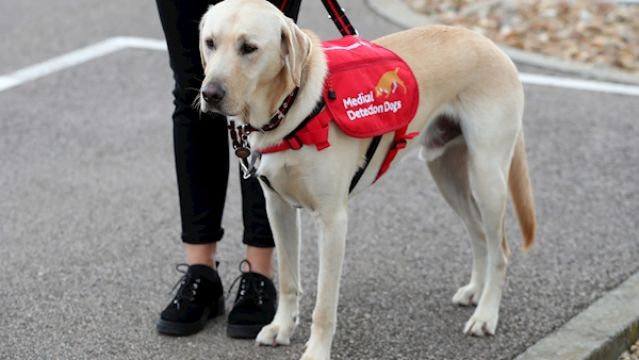The study is built on the scientifically proven ability of dogs to act as great biosensors, capable of detecting odours associated with human health, as well as drugs, explosives and food.
Researchers at the London School of Hygiene & Tropical Medicine are currently carrying out the research, which relies on samples from volunteers who have recently done a Covid-19 test or are experiencing symptoms and awaiting a test.
If successful, experts have predicted that sniffer dogs could screen up to 250 people per hour with an accuracy level of 98 to 100 per cent.
Professor James Logan, head researcher at the Department of Disease Control at London School of Hygeine and Tropical Medicine, told BBC radio 4 that the training could be completed in eight weeks but more volunteers were still needed.
"Some of our initial results look promising but we've still got a way to go, we've got to get more samples in from people who are positive with Covid-19 so we can fully know how well the dogs can do it.
"If anybody has had a very recent positive Covid test or currently has symptoms and are about to get a test, if they get in touch with us we will send them a pack which will contain a face mask, a pair of socks and a t-shirt which we will ask them to wear for a few hours.
"In the pack there's a pre-paid envelope which they can use to send it back to us, so it's really, really simple to do that. The way to get in touch is to visit the website which is www.virusdogs.com."
Prof Logan explained that the potential for Covid detection dogs ranged from scenarios including airports, commuter train stations, stadiums and any setting where large-scale testing with quick results was required.
"Airports are a prime candidate and somewhere that we might be able to deploy them but essentially we could deploy dogs anywhere where we have to screen lots of people very quickly. Each individual dog can screen up to 250 people per hour. We could use dogs in train stations for commuters, maybe work places, maybe even people going into schools and sporting events as well so anywhere where we have to screen lots of people very quickly.
"The training of the dogs is very quick so what's held us up a little bit is that the number of cases has gone down in the UK since the summer. Things are starting to increase again sadly in terms of the pandemic and we're starting to see more samples come in now."

"Once we've got all the samples, the full training of the dogs will take another eight weeks or so and then a few weeks after that we'd be looking to have dogs out there and working.
"We're pretty confident now that Covid-19 has an odour and our initial results have been promising but we know from other diseases and other research with Durham University that dogs can detect people with Malaria with really high accuracy."
A trial involving 20 dogs has already kicked off at Beirut Airport in Lebanon.







